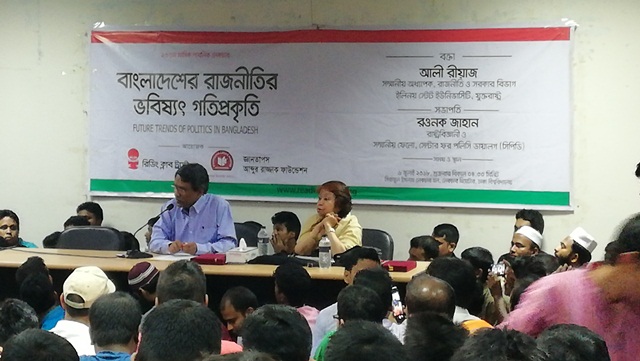‘India playing determinant role in Bangladesh’

India is almost playing the role of determinant in Bangladesh politics, said distinguished Professor Ali Riaz.
He described the state-level relationship between Bangladesh and India as 'sweet and sour' where Bangladesh is significant for India for geo-political reason, reports UNB.
Prof Riaz, who teaches at the Department of Politics and Government in Illinois State University, USA was speaking at the 23rd monthly public lecture titled 'Future Trends of Politics in Bangladesh', organised by Reading Club Trust and Gyantapas Abdur Razzaq Foundation at Sirajul Islam Lecture Hall in Dhaka University.
Bangladesh is now going through a deeper political crisis than that of past 46 years, he said on Friday.
"To understand the reason behind the crisis and identify the future pathway of the country's politics, four things are needed to be looked at -- the current face of governance, reaction from the new class of social stratification, influence of Islamists on society and politics; and the role of India,".
He called the current government a 'regime' because he said 'regime lasts longer than any government' using formal and informal institutions, UNB said.
A hybrid 'regime' is going on in the country where ensuring everyone's participation and everyone's right to vote is a 'matter of big concern', he said.
"All hybrid regimes are not the same. The most important factor is some of the aspects of such regime look like democratic while some others behave like autocratic," he said.
Claiming election as the only legal base to be there in power, Ali Riaz said: "After the 2008 election and the 15th amendment to the constitution, a new type of political system has come into the scene where election has been turned into a tool of authority, rather being a tool of democracy."
After the cancellation of the caretaker government system, now it has become impossible to defeat the ruling party, he said adding that once there was a vibrant civil society in the country which is now missing.
"The benefits of the existing economic growth for the past several decades are being enjoyed by only a few groups of the country. The real income of general people is reducing while resources are getting concentrated by a small group of people," Ali Riaz observed.
The wages of workers in informal sectors have increased by 24.7 percent from 2010-11 to 2014-15 whereas the consumer price index has increased by 32 percent, which shows a gap of 7 percent, he said referring to the data from Bangladesh Bureau of Statistics (BBS).
Referring to the Household Income and Expenditure Survey of BBS in 2016, the Illinois State University Professor said only 1.01 percent of the total income of the country is earned by the 10 percent poorest people.
"Six years ago, the percentage of the income was 2 which have come down to 1.01 percent meaning the poorest people are becoming even poorer. On the other hand, the income of the richest 10 percent of the population has increased from 35.84 percent to 38.16 percent in the last six years," Ali Riaz told his audience.
Condemning the current situation in the country's banking sector and growing unemployment rate, he said, "As per the BBS information, 45 percent of the capable population is unemployed."
In his lecture, he also said Islamisation of society has increased to a great extent in the last one decade and the need of Islamists will be seen in the future to validate lopsided election and mobilise grassroots voters.
While presiding over the public lecture, political scientist Rounaq Jahan condemned the ongoing violence over the quota reformation movement and urged the young generation to find a way to get out of this unstable situation.
